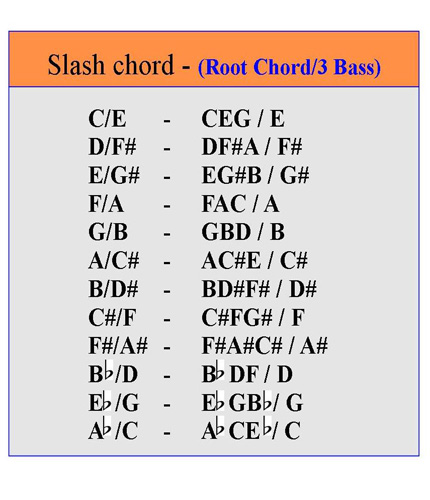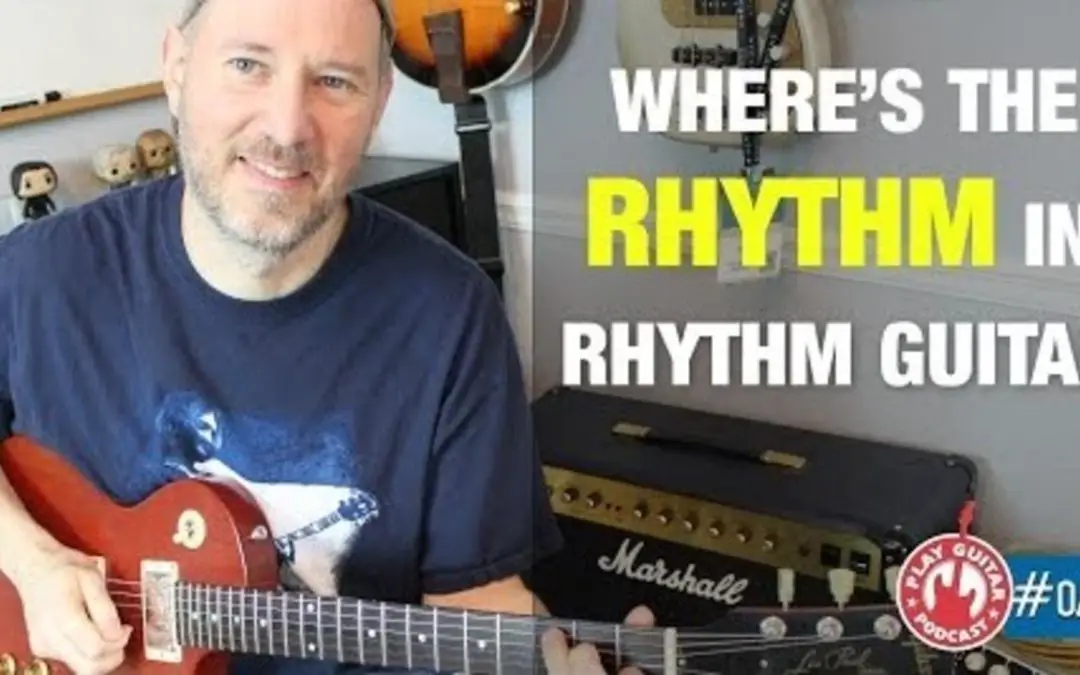Are you tired of feeling like a musical hack when it comes to playing rhythm guitar? Do you struggle to keep up with the fast-paced strumming of your favorite rock songs? Fear not, dear reader, for the time has come to conquer the world of slash notation with finesse and flair! In this article, we will dive into the wacky world of rhythm guitar, and uncover the secrets to mastering slash notation like a true rockstar. So grab your air guitar, crank up the volume, and get ready to rock and roll with some rhythm guitar tips that will have you shredding like a pro in no time!
Contents
- 1 Understanding Slash Notation in Rhythm Guitar Techniques
- 2 Exploring the Basics of Slash Notation for Improved Rhythmic Accuracy
- 3 Strategies for Implementing Slash Notation into Your Rhythm Guitar Playing
- 4 Advanced Tips for Mastering Slash Notation in Complex Rhythms
- 5 Overcoming Common Challenges When Reading and Playing Slash Notations
- 6 Expanding Your Musical Vocabulary with Slash Notation Skills
- 7 FAQs
- 8 Slash Your Way to Rhythm Guitar Mastery!
Understanding Slash Notation in Rhythm Guitar Techniques
Rhythm guitarists everywhere know the struggle of trying to keep up with tricky slash notation in music. It’s like trying to solve a Rubik’s cube blindfolded while riding a unicycle – difficult and confusing. But fear not, brave guitar warriors, for I am here to shed some light on this cryptic code of symbols.
First things first, let’s break down what exactly slash notation is. Simply put, it’s a shorthand way of notating rhythm patterns using slashes (/) and a number to indicate the beats per measure. Think of it as the secret language of rhythm guitarists – only the chosen few can decipher its mysteries.
Now, let’s dig into some examples to make things a bit clearer. Picture this: you’re staring at a sheet of music and you see something like 1 2 3 4 . What does this mean, you ask? Well, it’s telling you to play two strums on beats 1 and 3, with a rest on beats 2 and 4. See, it’s not rocket science – it’s just a clever way of organizing rhythm patterns.
So, next time you come across slash notation in your music, don’t panic. Take a deep breath, channel your inner rhythm guru, and tackle those slashes like the rockstar you are. With a little practice and a sprinkle of magic, you’ll be slashing through those rhythm patterns like a pro in no time.
Exploring the Basics of Slash Notation for Improved Rhythmic Accuracy
So you think you know everything about slash notation, huh? Well, buckle up because we’re about to dive deeper into this rhythmic world of wonder!
First things first, let’s break down the basics of slash notation. This simple but powerful tool is used to indicate rhythms in music. Instead of writing out every single note, you can just use a slash mark (/) to represent a beat. It’s like shorthand for musicians, but way cooler!
Now, let’s talk about some tips to improve your rhythmic accuracy with slash notation:
- Practice makes perfect: Just like anything else in music, the more you practice using slash notation, the better you’ll get at it. So don’t be afraid to slash away!
- Stay organized: Make sure your slashes are clear and easy to read. You don’t want to confuse yourself (or others) by making a messy notation.
- Use accents: Notation can sometimes be tricky to interpret, so adding accents or dynamics can help clarify the rhythmic patterns you’re trying to convey.
So there you have it, a crash course in the basics of slash notation. Now go forth and conquer those rhythms like the musical ninja you are!

Strategies for Implementing Slash Notation into Your Rhythm Guitar Playing
So you want to master slash notation in your rhythm guitar playing, huh? Well, you’ve come to the right place! Here are some strategies to help you implement this tricky technique into your playing:
- Start slow: Don’t try to tackle slash notation at full speed right away. Take it nice and easy and gradually build up your speed as you become more comfortable with the technique.
- Practice with a metronome: Timing is crucial when it comes to slash notation, so make sure you’re practicing with a metronome to keep yourself in check.
- Focus on your strumming: Slash notation involves a lot of quick and precise strumming, so make sure you’re paying close attention to your strumming technique as you practice.
Remember, Rome wasn’t built in a day, and neither will your slash notation skills. Keep practicing, stay patient, and before you know it, you’ll be slashing through those chords like a pro!

Advanced Tips for Mastering Slash Notation in Complex Rhythms
So, you think you’ve mastered slash notation in complex rhythms, do you? Well, buckle up, because we’re about to take it to the next level. Here are some advanced tips to help you truly become a slash notation ninja:
First off, don’t be afraid to experiment with odd time signatures. Sure, 4/4 is nice and safe, but why not try something a little more adventurous like 7/8 or 11/16? Embrace the challenge and watch your rhythmic skills soar.
Next, practice subdividing like a mad person. Get comfortable with breaking down beats into smaller and smaller increments. Remember, precision is key when it comes to mastering complex rhythms.
And finally, don’t forget about dynamics. Just because you’re focusing on rhythm doesn’t mean you can neglect the nuances of volume and intensity. Mix things up with accents, staccatos, and crescendos to add an extra layer of complexity to your slash notation masterpiece.

Overcoming Common Challenges When Reading and Playing Slash Notations
So you’ve decided to tackle the beast that is slash notations in music. Congratulations! But be warned, there are some common challenges you may face along the way. Here’s how to overcome them:
Confusing Symbols: One of the biggest hurdles when reading slash notations is deciphering all those weird symbols. But fear not! With a little practice, you’ll soon be able to differentiate between a strummed chord and a quick hammer-on.
Rhythm Madness: The rhythmic complexities of slash notations can be enough to make your head spin. But don’t panic! Take it slow, break it down into smaller parts, and before you know it, you’ll be grooving to the beat like a pro.
Hand Coordination: Playing slash notations can sometimes feel like patting your head and rubbing your stomach at the same time. But don’t despair! With some focused practice and maybe a few hand stretches, you’ll soon have those fingers flying across the fretboard with ease.
Expanding Your Musical Vocabulary with Slash Notation Skills
So you think you’re a musical genius, huh? Well, let me introduce you to the world of Slash Notation! No, it’s not some new type of punctuation – it’s a whole new way to expand your musical vocabulary and impress your friends with your skills.
Slash Notation is a shorthand way of writing musical chords that allows you to quickly and easily play along with songs without having to read complicated sheet music. It’s like a secret code that unlocks a whole new level of musical awesomeness.
With Slash Notation, you can learn to play your favorite songs faster than ever before and even start creating your own music with ease. No more struggling to decipher those pesky music sheets – just grab your guitar (or whatever instrument you fancy) and rock out like never before.
So what are you waiting for? Take your musical skills to the next level with Slash Notation and watch as your friends gaze in awe at your newfound musical prowess. Who knows, you might just become the next rock star sensation!
FAQs
How can I improve my rhythm guitar playing using slash notation?
Well, first off, imagine you’re not just playing regular chords on your guitar, but you’re actually a rockstar shredding away on stage. Get in the mindset of the pros, and soon enough, you’ll be master of the slash notation realm!
What are some common slash notation symbols I should be familiar with?
Think of it like learning a new language – except this language is the language of rock! Get cozy with symbols like “/”, “sus”, ”power”, and “7” to start unlocking the secrets of slash notation.
How can I practice playing slash notation effectively?
Practice makes perfect, my friend! Set aside some time each day to rock out with your guitar and focus specifically on slash notation. Soon enough, you’ll be riffing and shredding like a true guitar hero.
Any tips for incorporating slash notation into my own compositions?
Don’t be afraid to get creative! Experiment with different slash notation combinations and see what sounds cool to you. Before you know it, you’ll be writing catchy riffs and killer solos that will have everyone rocking out!
Slash Your Way to Rhythm Guitar Mastery!
So there you have it, all the tips and tricks you need to master slash notation and become a rhythm guitar pro! Remember, practice makes perfect, so keep on strumming those chords and don’t be afraid to unleash your inner rock star. With a little patience and a lot of determination, you’ll be shredding like Slash in no time. Rock on!



